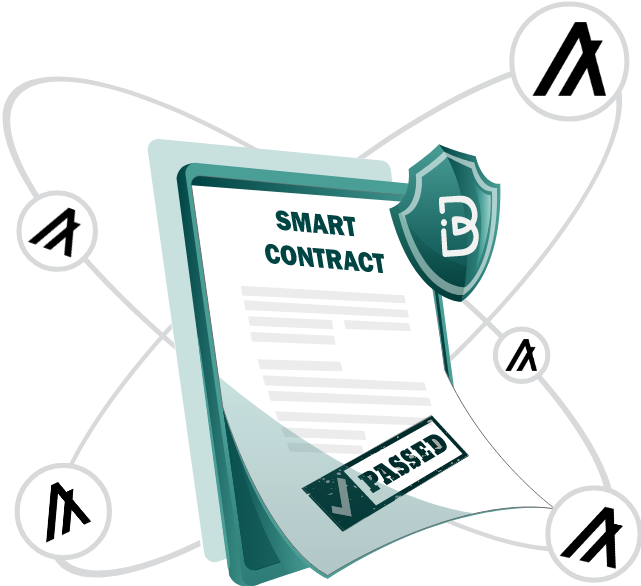What are Algorand Smart Contracts?
Algorand came into the market intending to make blockchain accessible to everyone. Smart contracts on Algorand are written in a new stack-based programming language, TEAL (Transaction Execution Approval Language). The contracts can be written directly with TEAL or using Python using the PyTeal library. TEAL is a very specific programming language. It's an assembly language Algorand Virtual Machine (AVM) used and has been created solely for this purpose.
At ImmuneBytes, we're focused on auditing your application in an end-to-end secure manner so that no vulnerability is missed. If you want us to audit your application on the Algorand blockchain- don't hesitate to contact us!
Why Is It Important?
Algorand is a new blockchain in the Web3 and DeFi space, using a language never seen before. Thus, auditing an Algorand smart contract becomes vital! TEAL requires us to build an AST (Abstract Syntax Tree) before execution.

No More Loss of Funds
Vulnerabilities in Algorand smart contracts can result in massive losses of funds, both yours and your clients. With ImmuneBytes audits, you can rest assured that your assets are safe on the blockchain.

Code Optimization
Gas plays an important role in Algorand smart contracts. It becomes crucial to optimize the usage of gas in your source code. We not only reveal bugs but also offer recommendations for improving gas usage.

Build Trust
The stamp of an audit on your smart contracts attracts potential investors and clients. Smart contracts audited by ImmuneBytes have a lesser chance of getting exploited.
Crypto Exploiters Stole Away $3.8 Billion in 2022.
Are You Next in the Line?
Why Should You Undergo An Algorand Smart Contract Audit?
Algorand, being a nascent platform, intrigues the hackers to get exploited if a weakness is found in your project. Smart contract vulnerabilities allow hackers to get a backdoor entry into your system and destroy its working. As the Arbitrum ecosystem grows, so does the number of applications built on it. Thus, a security audit is crucial to make your project stand out and not get exploited.
$6B
Lost in Crypto Hacks So Far
$3.8B
Lost in 2022 Alone
82%
Hacks Targeted Defi Protocols
3x Damage
Lost funds + Lost trust + Lost market value
What Do We Offer?
Our blockchain experts extensively audit your smart contract code, find potential bugs and attack verticals. Don't risk getting hacker! Get an audit by ImmuneBytes' experts.


Extensive Audit Report
Our audit reports are comprehensive and document every measure taken during the audit process. We classify the vulnerabilities according to their severity levels and offer remediations and code optimizations.


Check For 100+ Vulnerabilities
We analyze a smart contract for over a hundred vulnerabilities. These include bugs that have been exploited and others that could be exploited in the future.


Smart Contract Fuzzing
We fuzz-test your smart contracts as an additional measure. Fuzzing a smart contract ensures that it will not behave unexpectedly against any given input, minimizing the risk of hacks.


Post Refactor Reaudits
Not just once, we audit your code twice! Once your developers review our audit report and make the recommended fixes, we again analyze your contract and prepare the final audit report.


Security Test Cases
Our auditors use frameworks like Foundry, HardHat and Truffle to write unit test cases other than the developers provided. We ensure to traverse every possible branch of execution in the source code.


Quick Turnaround Time
A dedicated team of auditors is assigned to your project, who usually take 3-10 days to complete an audit, depending on the code size. We are result-oriented and understand the gravity of deadlines.
In 2022, Ronin Network Lost $625 Million in an Exploit and Still Survived.
Can You Handle Anything Remotely Close to This?
Recent Blogs
Everything you need to know to get familiar with Web3! News, Blogs, Announcements and more.
FAQs
The world of Algorand is enormous. And so are the questions associated with them. Here, we list the top 5 most frequently asked questions on the Algorand Ecosystem.
